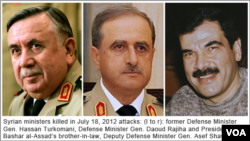The high-level assassinations on Wednesday of at least three top Syrian officials targeted President Bashar al-Assad's national security team, leaving a large void in the country's military leadership.
The casualties include Defense Minister Daoud Rajha; General Asef Shawkat, the Syrian military's deputy chief of staff, who is married to Assad's elder sister; and Hassan Turkmani, a former defense minister and senior military adviser.
They are the first prominent officials killed in the 16-month anti-government uprising and represent a turning point in Syria's increasingly violent civil war. The men were from Syria's core leadership team attempting to suppress the revolt and, experts say, the president might have trouble replacing them.
Syrian state television called the blast a "suicide terrorist attack," while Free Syrian Army (FSA) commander Riad al-Asaad said rebel forces planted a bomb in the room and detonated it.
Brian Sayers, director of government relations for the Syrian Support Group, a U.S.-based lobbying organization of FSA supporters, quoted sources in Syria as saying the attack was most likely carried out by an opposition sympathizer working in the Assad government.
That view was echoed by Fabrice Balanche, director of the French research center Gremmo and a Syria expert, who said "[The bombing] demonstrates complicity inside the Syrian government, and shows that [dissidents] are staying in government to destroy it from within."
New Military Leader Named
The government moved quickly to assert control, naming General Fahed Jassem al-Freij, the military chief of staff, as Syria's new defense minister. In a statement on state television, Freij said the military would not be deterred from "cutting off every hand that harms the security of the homeland and citizens."
Nadim Shehadi, a Middle East expert with Chatham House in London, said targeted killings could damage the opposition's position and that the lack of decisive international intervention is forcing rebels to use military action to oust Mr. Assad, a tactic he said could prove costly in the future.
"The more militarized the conflict gets, the more difficult the transition will be later," Shehadi said. "All the people now being armed will have to be disarmed when the regime falls. The international community's non-position on this, and non-interference, is something that will cost it a lot later."
Shehadi called Wednesday's bombing "a double-edged sword" because he said he does not believe opposition rebels can defeat the government with military force alone.
Analyst Fabrice Balanche agreed, saying the rebels are "trying to kill the heart of the Syrian [government] because they are not capable of effectively fighting Assad's official army. They are attempting to decapitate the government [and] demoralize the Syrian army."
Attacks Target Inner Circle
Former U.S. Deputy National Security Adviser Elliott Abrams, who served in President George W. Bush's administration, said the assassinations offer a sharp warning for the inner group of loyalists from President Assad's Alawite sect, an offshoot of Shi'ite Islam.
"The defense minister was a Christian and not part of the Alawite elite that rules the country. But [General Asef] Shawkat was part of that elite which now understands that it itself is vulnerable," Abrams said. "Assad can continue to rule without one individual or another. But I think this does shake the regime and suggest to everybody in it that really the handwriting is on the wall [i.e., the future is clear] and that they are going to fall," he said.
The Syrian Support Group said the FSA has about 50,000 fighters and controls large portions of Syria. Syrian Canadian Louay Sakka, a co-founder of the support group, said that as of last month, President Assad's army consisted of 350,000 troops, but was actively using only 60,000-70,000 troops.
Assad in a Bind
Damascus-based journalist Farhad Hama told VOA's Kurdish Service that the killings have put Mr. Assad's government in a precarious position. "Damascus is now in a chaotic situation security-wise because those who were killed had direct influence and control over security forces and the army," he said.
The attack has increased tensions between government soldiers and the opposition, with fierce clashes reported in several Damascus neighborhoods.
Activists in the Syrian capital said traffic is thin and almost all shops are closed. A series of defections from government forces also has been reported, including two brigadier generals who fled to Turkey.





